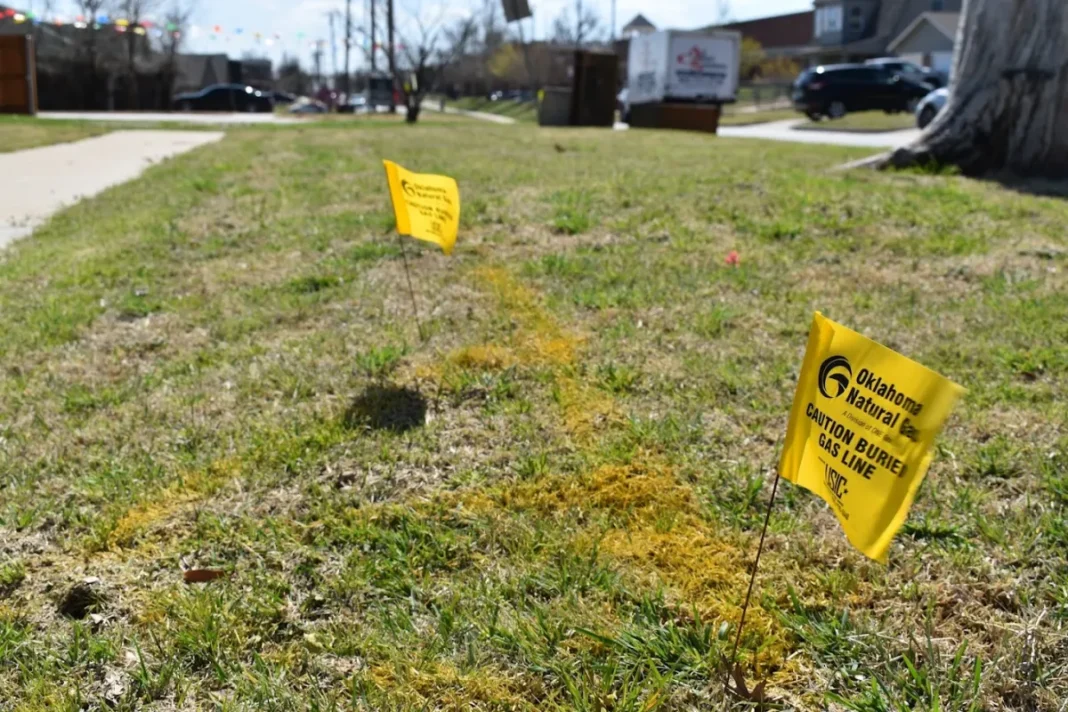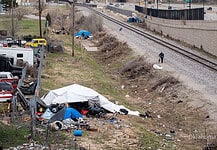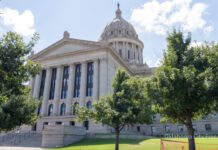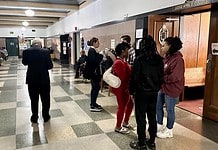OKLAHOMA CITY — More than three years after a massive winter storm blasted Oklahoma and the central United States, utility customers have seen little progress in lawsuits filed against natural gas companies and traders over the huge spike in prices.
Oklahoma Attorney General Gentner Drummond last summer said his office would work with outside counsel to investigate possible market manipulation by natural gas traders. The attorney general established a tip line in December to gather information from people with knowledge of the natural gas trading environment during the storm.
At one point during the February 2021 winter storm, natural gas prices in Oklahoma’s trading hub exceeded more than $1,200 per thousand cubic feet, the highest in history. At no other regional trading hub did natural gas spot prices get as high as they did in Oklahoma. Regional natural gas prices before the storm traded in the $3 range.
Customers of Oklahoma’s largest natural gas and electrical utilities are now paying back billions of dollars in fuel costs, plus billions in interest payments, through winter storm charges on each monthly bill for more than 20 years.
About $3 billion in Oklahoma ratepayer-backed bonds were sold in 2022 to pay for natural gas consumed during the storm. While storm-related utility bonds have been sold in other states, they typically go toward replacing infrastructure like power lines, pipelines or power plant repairs, not to pay for consumable items like fuel.
The attorney general’s office contracted with Oklahoma City law firm Foshee & Yaffe to investigate market manipulation related to the February 2021 winter storm. The firm beat two other law firms in the bid. Foshee & Yaffe’s contract pays them on a contingency fee basis, which means they only get paid if they win the case. The contract caps the contingency fee at $50 million, excluding costs.
Scattered resolutions
There have been resolutions in scattered lawsuits related to the storm. Oklahoma Natural Gas sued one of its gas suppliers, NextEra Energy Marketing LLC, in April 2021 over $6.9 million in disputed natural gas bills.
The utility, which spent more on natural gas during the storm than the entire previous year, claimed NextEra breached previous, fixed natural gas contracts and sold gas at higher prices during parts of the storm. NextEra, in turn, said weather-related issues led it to declare force majeure, a contract provision typically invoked when a supplier can’t deliver because of an act of God outside of its control. NextEra countersued to get ONG to pay its bill. The companies reached a settlement in early 2022 before going to trial.
Regulatory filings show ONG told the Oklahoma Corporation Commission the utility disputed $28 million in invoiced charges for natural gas used during the storm, a drop in the bucket compared to its total outlay. ONG, along with sister natural gas utilities in Texas and Kansas, spent more than $1.9 billion on natural gas during the February 2021 storm. The utility’s 900,000 Oklahoma customers were on the hook for almost $1.3 billion of those natural gas charges.
In an email, ONG spokesman Chad Previch said the terms of the NextEra settlement were confidential. NextEra did not respond to requests for comment.
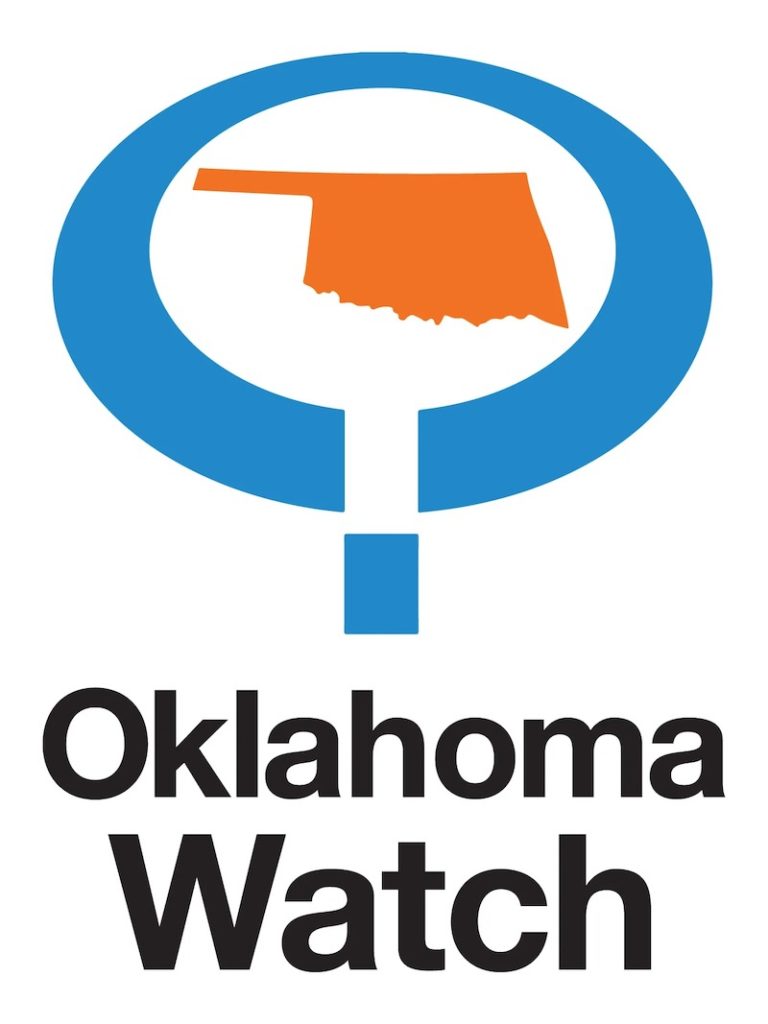
“The remaining amount we identified has not been settled,” Previch said. “If and when that amount is settled, those costs will be returned to our customers through the normal fuel cost portion of our bills, also called the purchased-gas adjustment (PGA), not through securitization.”
With almost $430 million in sales, NextEra was the top supplier of natural gas to Oklahoma utilities during the storm, according to data from the Oklahoma Corporation Commission. More than 95% of NextEra’s natural gas sales went to ONG.
By law, Oklahoma utilities can’t mark up the fuel they consume. Those costs are passed directly to customers in a part of the bill called the fuel-adjustment clause. In normal times, regulators audit fuel charges to make sure utilities aren’t collecting too much or too little from customers as fuel prices fluctuate depending on both the time of year and demand. But utilities have little incentive to hold fuel costs down in an emergency if the final bill goes straight to customers.
Minnesota customers benefit
Minnesota regulators disallowed almost $60 million in natural gas costs for utilities in that state related to the February 2021 winter storm. They said Minnesota utilities didn’t plan properly for extreme cold and had an expectation that higher fuel costs would just get passed on to customers.
“One of the reasons the utilities failed to mitigate the extraordinary costs was that they lacked the incentive to do so,” said a March 2022 filing from the Minnesota attorney general’s office arguing for a reduction in fuel charges. “The pass-through mechanism by which the cost of gas is normally recovered results in less incentive for utilities to control the cost of natural gas than exists for utility expenses recovered through other mechanisms, such as base rates.”
Minnesota’s Citizens Utility Board, which represents consumers in that state’s utility regulation, noted the state stood alone when it came to challenging utilities about higher fuel costs from the storm.
“Indeed, Minnesota’s Commission took a much stronger stance than utility regulators in other states, including Oklahoma, Texas, and Arkansas, where CenterPoint (Minnesota’s largest natural gas utility) was permitted to recover the full amount of its storm-related extraordinary costs (plus ‘carrying costs’),” the Citizens Utility Board said in a press release.
Oklahoma Corporation Commissioner Bob Anthony has been the lone voice of dissent on the three-member Corporation Commission for how his fellow regulators handled the extreme natural gas costs during the winter storm. Natural gas producers and traders got paid, the utilities took billions of dollars in natural gas costs off their corporate balance sheets and maintained their top credit ratings even as interest rates began rising, he said.
“The only people who are not happy are the AARP and all the rest of the individual consumers and ratepayers,”
Corporation Commissioner Bob Anthony
“The only people who are not happy are the AARP and all the rest of the individual consumers and ratepayers,” Anthony said.
Anthony called the ONG settlement with NextEra inconsequential. Under the bonds, the utility’s consumers are paying both financing costs along with the natural gas costs for the disputed billing amounts still under review.
“It was peanuts,” Anthony said. “But both corporate entities had a business reason not to pursue it. NextEra is a huge company; they do lots of business with people. They don’t want their reputation to have a dark cloud on it. (ONG parent company) ONE Gas wanted to sell bonds. You can’t get a triple-A rating if the product you’re selling is under litigation. They had to shut that thing down.”
A smaller regulated utility, Arkansas Oklahoma Gas Corp., won an $18 million judgment against global energy company BP over winter storm costs. The utility, which has 58,000 customers in eastern Oklahoma and Arkansas, said BP failed to provide the full amount of gas it had under contract during the storm. It sued for $34 million in damages in federal court.
U.S. District Judge P.K. Holmes III didn’t buy BP’s argument that it curtailed the gas delivery to the utility under the contract’s force majeure clause. He said BP made a business decision not to secure the full amount of gas beforehand and hoped to make up the difference on the spot market.
“But when that day finally arrived, BP lost its gamble and breached the contract,” Holmes wrote in his May 2023 opinion. He later directed BP to pay $1.5 million in attorney fees and court costs. BP did not appeal.
Arkansas Oklahoma Gas did not have enough natural gas costs from the February 2021 winter storm to merit issuing ratepayer-backed bonds. Instead, the utility got approval to recover $18 million in fuel costs from the storm from its Oklahoma customers over 15 years under a utility accounting method called a regulatory asset. That amount has been reduced by $3.5 million for its Oklahoma customers because of the utility’s win in court against BP.
Clawback mechanism
Oklahoma’s winter storm bonds include clawback provisions that benefit ratepayers if resolutions are reached in lawsuits or investigations about possible natural gas price manipulation. But Anthony said utilities had little incentive to pursue those lawsuits after the bonds were sold.
Previch, with ONG, said the NextEra settlement wasn’t subject to clawback under the ratepayer-backed bonds because it came before the bonds were sold. That means the settlement, at most $7 million, wasn’t included in ONG’s $1.3 billion bond issuance for extraordinary costs from the February 2021 winter storm.
In approving the ratepayer-backed bond deals, the Corporation Commission included a provision saying all natural gas purchases by the utilities were prudent, a regulatory term that presumes they used their expertise at the time to incur only reasonable costs. The utilities were under an emergency commission order during the storm to preserve life, keep the power on and keep natural gas flowing to heat homes. ONG said just 500 of its 900,000 natural gas customers in Oklahoma lost service during the storm.
The two other commissioners, Chairman Todd Hiett and Vice Chair Kim David, said the attorney general or the federal government are the proper authorities to investigate natural gas prices. Hiett has said the securitization of fuel costs from the winter storm was the best of several bad options. It minimized the effect on monthly bills and allowed the utilities to keep good credit ratings, meaning it was cheaper for them to borrow for capital-intensive projects like generating plant upgrades, pipelines or other infrastructure.
In its most recent annual investigations report, the Federal Energy Regulatory Commission only once mentioned natural gas market manipulation from the February 2021 winter storm. The commission looked into allegations a gas marketing company curtailed supplies, citing force majeure, and sold gas to a different customer at elevated prices. It did not name the company and closed the investigation.
“Enforcement staff found that the marketing company’s decision to sell gas to the different customer appeared to have been made during a small window of time when the marketing company believed its curtailments would be less substantial,” the federal commission said in the report issued in November. “Enforcement staff also did not find evidence that the marketing company actively sought out buyers to sell gas to at an elevated price. To the contrary, the purchaser unilaterally reached out to the marketing company requesting gas.”
Kansas, Texas lawsuits
Kansas Attorney General Kris Kobach in December refiled a federal court case against Macquarie Energy LLC that was first filed in state court. Kobach’s office claims Macquarie overpaid for natural gas by manipulating a daily spot price on the local trading hub and reselling the gas at inflated prices to Kansas utility consumers during the winter storm. That inflated daily price allowed the company to benefit from future average prices set on the local trading hub, Kobach’s office said.
“Macquarie’s market power on the Southern Star pipeline afforded it the opportunity to extract uneconomic profits using fixed-price trades, such as the trade, to influence benchmark prices higher, in favor of its market position,” the Kansas attorney general said in its petition.
Macquarie denied similar allegations in the previous federal case in Kansas but has not yet answered the latest petition. A federal judge in Kansas is considering consolidating Kobach’s lawsuit with several consumer lawsuits in Kansas over natural gas prices during the February 2021 winter storm.
Macquarie Energy is among the five largest natural gas traders in the U.S. market. Macquarie sold $154 million in natural gas to Oklahoma electric and natural gas utilities during the winter storm, according to sales data from the Oklahoma Corporation Commission. Documents obtained under the Oklahoma Open Records Act show Macquarie was the other seller, along with NextEra, that Oklahoma Natural Gas disputed $28 million in natural gas sales during the winter storm.
In Texas, an energy market data analyst who used to work for Enron Corp. has recruited thousands of consumers to an ambitious lawsuit claiming price manipulation during the February 2021 winter storm. Circles X founder Erik Simpson started Texans Helping Texans to pursue what’s called a multi-district claim in Texas.
In the lawsuit, Simpson said natural gas producers and traders manipulated the Texas natural gas market by curtailing production and putting gas into storage in the days leading up to the winter storm. His lawsuit said producers and traders routed their gas to the lightly state-regulated intrastate pipeline systems of Texas, as opposed to the more heavily federally regulated interstate pipeline systems that send natural gas out of state.
Circles X developed software to decipher public metering data about natural gas flows in Texas on pipelines. The lawsuit said that data backs up its allegations of price manipulation.
“To achieve their goal, defendants began using critical notices, OFOs (operational flow orders) and force majeure declarations to reduce pipeline deliveries to customers with contracts, allowing defendants to sell that natural gas on the spot market for higher prices, and re-routing natural gas from the interstate pipelines to intrastate pipelines where there is little regulatory oversight, which enabled defendants to manipulate the natural gas supply and direct it to the market where they could get the highest prices,” the Circles X lawsuit said.
The lawsuit faces several hurdles, including objections from at least two utilities that disputes between a utility and customers on natural gas costs should be at the state’s regulator, the Texas Railroad Commission, and not with the courts. The scores of natural gas companies and their subsidiaries named in the lawsuit have denied wrongdoing in court filings.
“Claims for unlawful competitive activity and market manipulation are subject to well-developed, rigorous legal standards that cannot be avoided by casting those claims as state law tort claims,” said a February court filing by the defendants in Harris County, Texas.
Circles X said it also has data about Oklahoma natural gas flows on intrastate and interstate pipelines during the February 2021 winter storm. It sent brief letters and emails about that data to both Oklahoma Attorney General Gentner Drummond and Corporation Commissioner Bob Anthony.
Meanwhile, CPS Energy, a municipal utility in Texas that serves 1.3 million electricity and natural gas customers in the San Antonio area, filed more than a dozen lawsuits against natural gas companies in the months following the February 2021 winter storm. The utility has secured several settlements, but it successfully fought requests by local media to disclose the settlement amounts.
Republished in partnership with Oklahoma Watch under Creative Commons license. Free Press publishes this report as a collaborative effort to provide the best coverage of state issues that affect our readers.
Paul Monies has been a reporter with Oklahoma Watch since 2017. He covers state agencies and public health. Call or text him at (571) 319-3289 or email [email protected]. Follow him on Twitter at @pmonies.
